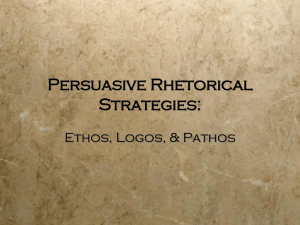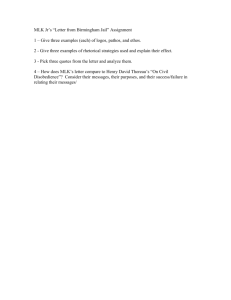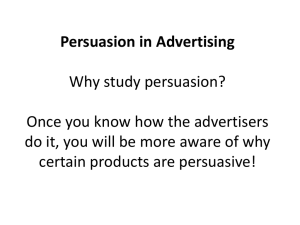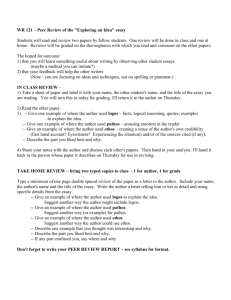Arguing With Aristotle Ethos, Pathos, Logos
advertisement
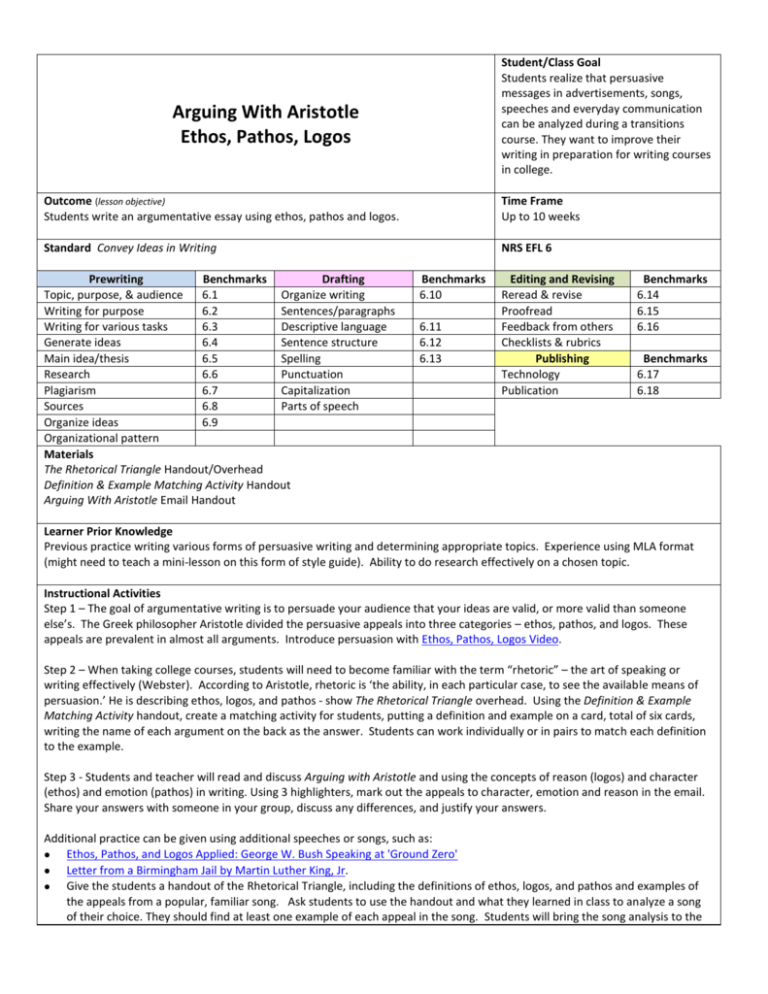
Student/Class Goal Students realize that persuasive messages in advertisements, songs, speeches and everyday communication can be analyzed during a transitions course. They want to improve their writing in preparation for writing courses in college. Arguing With Aristotle Ethos, Pathos, Logos Outcome (lesson objective) Students write an argumentative essay using ethos, pathos and logos. Time Frame Up to 10 weeks Standard Convey Ideas in Writing NRS EFL 6 Prewriting Benchmarks Drafting Topic, purpose, & audience 6.1 Organize writing Writing for purpose 6.2 Sentences/paragraphs Writing for various tasks 6.3 Descriptive language Generate ideas 6.4 Sentence structure Main idea/thesis 6.5 Spelling Research 6.6 Punctuation Plagiarism 6.7 Capitalization Sources 6.8 Parts of speech Organize ideas 6.9 Organizational pattern Materials The Rhetorical Triangle Handout/Overhead Definition & Example Matching Activity Handout Arguing With Aristotle Email Handout Benchmarks 6.10 6.11 6.12 6.13 Editing and Revising Reread & revise Proofread Feedback from others Checklists & rubrics Publishing Technology Publication Benchmarks 6.14 6.15 6.16 Benchmarks 6.17 6.18 Learner Prior Knowledge Previous practice writing various forms of persuasive writing and determining appropriate topics. Experience using MLA format (might need to teach a mini-lesson on this form of style guide). Ability to do research effectively on a chosen topic. Instructional Activities Step 1 – The goal of argumentative writing is to persuade your audience that your ideas are valid, or more valid than someone else’s. The Greek philosopher Aristotle divided the persuasive appeals into three categories – ethos, pathos, and logos. These appeals are prevalent in almost all arguments. Introduce persuasion with Ethos, Pathos, Logos Video. Step 2 – When taking college courses, students will need to become familiar with the term “rhetoric” – the art of speaking or writing effectively (Webster). According to Aristotle, rhetoric is ‘the ability, in each particular case, to see the available means of persuasion.’ He is describing ethos, logos, and pathos - show The Rhetorical Triangle overhead. Using the Definition & Example Matching Activity handout, create a matching activity for students, putting a definition and example on a card, total of six cards, writing the name of each argument on the back as the answer. Students can work individually or in pairs to match each definition to the example. Step 3 - Students and teacher will read and discuss Arguing with Aristotle and using the concepts of reason (logos) and character (ethos) and emotion (pathos) in writing. Using 3 highlighters, mark out the appeals to character, emotion and reason in the email. Share your answers with someone in your group, discuss any differences, and justify your answers. Additional practice can be given using additional speeches or songs, such as: Ethos, Pathos, and Logos Applied: George W. Bush Speaking at 'Ground Zero' Letter from a Birmingham Jail by Martin Luther King, Jr. Give the students a handout of the Rhetorical Triangle, including the definitions of ethos, logos, and pathos and examples of the appeals from a popular, familiar song. Ask students to use the handout and what they learned in class to analyze a song of their choice. They should find at least one example of each appeal in the song. Students will bring the song analysis to the next class and share. Step 4 - Crafting compelling, persuasive arguments is a skill, and as with any skill it gets easier and easier with practice. Choose a situation you would like to be able to persuade someone to make a specific decision or embark on a specific course of action. First, write three separate persuasive arguments – one a pure appeal to ethos (establishing your character), one to pathos (connecting with their imagination and emotion), and one to logos (a straight appeal to logic and reason.) Now put the three together into one, combining the best of each to create a compelling, multi-faceted appeal. Step 5 – In preparation for writing a research paper, students must choose a controversial topic to research and for the next class submit a proposal including topic and at least 3 resources. After approved, students will write the first paragraph, including the thesis and basic arguments while continuing their research. Establish markers of completion based on your classroom structure for when rough draft (at least 3 pages typed with footnotes indicated) of middle section is due. Students are expected to show an indication of understanding ethos, pathos and logos in their argument. If technology is available, students can upload the beginning and middle sections of their essay into a platform such as Blackboard or Wiggio. They will turn in the rough draft of the conclusion and bibliography for comment. Students will be expected to prepare for peer review of papers, critiquing other student’s work. A final copy of their research paper will be loaded into Blackboard and a printed copy given to teacher. Assessment/Evidence (based on outcome) Definitions & Examples Matching Highlighted text of email, speeches Teacher Observation Class Discussion Ethos, Pathos, Logos Writing Sample Argumentative Essay Teacher Reflection/Lesson Evaluation not yet completed Next Steps Continue writing various forms of essays in preparation for taking English composition courses. Technology Integration Ethos, Pathos, Logos Video http://www.youtube.com/watch?v=tAsxyffBqm0 A General Summary of Aristotle’s Appeals http://courses.durhamtech.edu/perkins/aris.html Argumentative Essay PPT umhs.eduhsd.k12.ca.us/Owl/argumentation.ppt Ethos, Pathos, and Logos Applied: George W. Bush Speaking at 'Ground Zero' http://www2.bc.cc.ca.us/jgiertz/Speech%205/Rhetoric/Bush%20911%20analysis.htm Letter from a Birmingham Jail by Martin Luther King, Jr. http://www.africa.upenn.edu/Articles_Gen/Letter_Birmingham.html Ethos, Pathos, Logos: 3 Pillars of Public Speaking http://sixminutes.dlugan.com/ethos-pathos-logos/ The Rhetorical Triangle http://www.iupui.edu/~uwc/pdf/Rhetorical%20Triangle.pdf The Rhetorical Triangle http://www.public.asu.edu/~jvanasu/rhet-triangle.htm LOGOS (idea, message) PATHOS (force, emotion) ETHOS (form, manner) Every communication is essentially a trilateral relationship. Each point of the triangle influences the others, and all are influenced by the context of the communication. Each point of the triangle bears some responsibility for the success of the communication, and each point of the triangle corresponds with one of Aristotle's three appeals (i.e., general means of persuasion). Rational Appeals (logos) Emotional Appeals (pathos) appeal to logical reasoning ability appeal to beliefs and of readers feelings higher emotions facts case studies statistics experiments logical reasoning analogies anecdotes authority voices belief in fairness love pity etc. lower emotions greed lust revenge etc. Ethical Appeals (ethos) sense you (author) give as being competent/fair/authority trustworthiness credibility reliability expert testimony reliable sources fairness Think of how one speaks to an opponent: For example on the floor of the Senate in heated debate the speaker would refer to "My honorable opponent." This is why one refers to the "manner of delivery." Definition & Example Matching Activity Definition Example Logos The Greek word logos is the basis for the English word logic. Logos is a broader idea than formal logic--the highly symbolic and mathematical logic that you might study in a philosophy course. Logos refers to any attempt to appeal to the intellect, the general meaning of "logical argument." Everyday arguments rely heavily on ethos and pathos, but academic arguments rely more on logos. Yes, these arguments will call upon the writers' credibility and try to touch the audience's emotions, but there will more often than not be logical chains of reasoning supporting all claims. Let us begin with a simple proposition: What democracy requires is public debate, not information. Of course it needs information too, but the kind of information it needs can be generated only by vigorous popular debate. We do not know what we need to know until we ask the right questions, and we can identify the right questions only by subjecting our ideas about the world to the test of public controversy. Information, usually seen as the precondition of debate, is better understood as its by product. When we get into arguments that focus and fully engage our attention, we become avid seekers of relevant information. Otherwise, we take in information passively--if we take it in at all. Ethos is related to the English word ethics and refers to the trustworthiness of the speaker/writer. Ethos is an effective persuasive strategy because when we believe that the speaker does not intend to do us harm, we are more willing to listen to what s/he has to say. For example, when a trusted doctor gives you advice, you may not understand all of the medical reasoning behind the advice, but you nonetheless follow the directions because you believe that the doctor knows what s/he is talking about. Likewise, when a judge comments on legal precedent audiences tend to listen because it is the job of a judge to know the nature of past legal cases. My Dear Fellow Clergymen: While confined here in Birmingham city jail, I came across your recent statement calling my present activities "unwise and untimely."...Since I feel that you are men of genuine good will and that your criticisms are sincerely set forth, I want to try to answer your statement in what I hope will be patient and reasonable in terms. I think I should indicate why I am here in Birmingham, since you have been influenced by the view which argues against "outsiders coming in."...I, along with several members of my staff, am here because I was invited here. I am here because I have organizational ties here. But more basically, I am in Birmingham because injustice is here. Just as the prophets of the eighth century B.C. left their villages and carried their "thus saith the Lord" far beyond the boundaries of their home towns, and just as the Apostle Paul left his village of Tarsus and carried the gospel of Jesus Christ to the far corners of the Greco-Roman world, so am I compelled to carry the gospel of freedom beyond my own home town. Like Paul, I must constantly respond to the Macedonian call for aid. Christopher Lasch, "The Lost Art of Political Argument" Ethos Martin Luther King, Jr. "Letter from Birmingham Jail" Pathos Pathos is related to the words pathetic, sympathy and empathy. Whenever you accept a claim based on how it makes you feel without fully analyzing the rationale behind the claim, you are acting on pathos. They may be any emotions: love, fear, patriotism, guilt, hate or joy. A majority of arguments in the popular press are heavily dependent on pathetic appeals. The more people react without full consideration for the WHY, the more effective an argument can be. Although the pathetic appeal can be manipulative, it is the cornerstone of moving people to action. Many arguments are able to persuade people logically, but the apathetic audience may not follow through on the call to action. Appeals to pathos touch a nerve and compel people to not only listen, but to also take the next step and act in the world. For me, commentary on war zones at home and abroad begins and ends with personal reflections. A few years ago, while watching the news in Chicago, a local news story made a personal connection with me. The report concerned a teenager who had been shot because he had angered a group of his male peers. This act of violence caused me to recapture a memory from my own adolescence because of an instructive parallel in my own life with this boy who had been shot. When I was a teenager some thirty-five years ago in the New York metropolitan area, I wrote a regular column for my high school newspaper. One week, I wrote a column in which I made fun of the fraternities in my high school. As a result, I elicited the anger of some of the most aggressive teenagers in my high school. A couple of nights later, a car pulled up in front of my house, and the angry teenagers in the car dumped garbage on the lawn of my house as an act of revenge and intimidation. James Garbarino "Children in a Violent World: A Metaphysical Perspective" Arguing with Aristotle Email The other night, we received this rather unexpected e-mail from our 14 year old son, reprinted here with his permission: Subject: Sorry to send this to you in an e-mail… I know re-registration for school is coming up, and I’m also aware how happy both you and Mommy are with me being there. The thing is, I have such amazing friends at the local public high school that (even though I may not show it all the time), I miss them so incredibly much, and I think about them every day wishing we had never split up. With such a perfect opportunity to continue our friendships together, it seems SO STUPID to me that we’re at different schools, when we could have all stayed together. Every day that I’m sitting in class and I go off into a daydream, I think of all the fun we could be having together, all the times we’re missing, just so that I can be at a private school with a good reputation. The truth is, the local public high school offers just as good Honors classes, it just has a worse reputation because of some of the kids that go there. Sure I’ve made new friends here, but I’ve been hanging out with them every day when I could be hanging out with my best friends every single day. I know you probably won’t believe me on this, but I decided to go here on a sort of an impulse, and because of the excitement of getting accepted in to such a well-spoken of school. I’ve been regretting that decision just about every day since the first day of school. I sort of feel like my friends’ and my relationships are splitting apart, just because of differences between schedules. Also, don’t think that sending me to a private school is going to keep me out of drugs. I mean let’s be serious: high schools will have ample amounts of drugs no matter where I go, and I’m tired of all the racism, popularity contests, and disputes over who has more money. I’ve met at least twenty freshmen that lost their virginity in middle school, and apparently where I go to school it’s cool to do drugs, put down others for not doing so, and so on and so forth. I’ve already found out that there’s no such thing as a perfect school, and whether it be a private or public school is just based on which families have more money. Now, don’t think I believe that none of this won’t happen anywhere else, because I’m not stupid. It just seems crazy for me not to go to a school with people I’ve known for so long, because these last four years are my last ones before we all split up for good. I know there are grammatical errors in here, it might not flow very well, and I probably jumped around quite a lot, but I just want to say that this came from the heart, and I mean everything I said. Please just talk to each other about this. Sorry that I sent it in an e-mail rather than in person, but I just thought I could say what I wanted on here without being interrupted. Arguing With Aristotle Email Handout Besides causing both his mother and me to burst into tears while reading it, it also impressed us because it was such a wonderful (if completely unconscious) example of Aristotle’s three rules for persuasive argument in action – ethos, pathos, and logos. Let’s take a quick look at each one of these in turn: 1. Ethos Ethos is the Greek word for character, and it is used in rhetorical argument as a way of establishing the credibility of the speaker. Ethos can be assumed through reputation, revealed through an honest and open revelation of biases and weaknesses, and/or borrowed via quotation. If our persuasive efforts were limited to appeals to our character, even the best amongst us would often be dismissed as “well-meaning but misguided”. This is why it is important that our persuasive arguments also include… 2. Pathos Pathos comes from the Greek words for both “suffering” and “experience”, and is in one sense a purely emotional appeal. However, it is also an appeal to the imagination of the listener, urging them to think themselves into the speaker’s shoes and in so doing, empathize with their situation in a way that will move them to decide or act in alignment with the speakers’ wishes. “If you could see it the way I see it”, pathos tells us, “you would want what I want.” Yet powerful as an appeal to pathos may be, particularly when backed by a strong ethos, it will still break down if there is not at least some acknowledgement of… 3. Logos Logos comes from the Greek word for “word”, and is what most of us think of as the primary tool for persuasion – using reason and logic to create agreement. If ethos is an appeal to character and pathos an appeal to emotion, logos is primarily an appeal to reason. Yet as anyone with husband, wife, parent, child, boss or employee will tell you, people are consistently and at times frustratingly un-reasonable in their decisions and actions. As with any good persuasive argument, his relatively balanced use of ethos, pathos and logos throughout allowed him to get his point across in a way that whether or not we ultimately went along with his conclusions, we could not dismiss what he had to say as either ignorant (because he clearly establishes his character throughout), unempathetic (because of his acknowledgement of both his and our likely emotional hot buttons), or illogical (because of the clarity of his reasoning and internal consistency of the logic of his argument). Of course, the final metric of any good persuasive argument is in the result – does your argument result in the specific decision or course of action you desire? And as I know some of you will be wondering, Nina and I did speak about our son’s request at great length. Having gained agreement about the level of academic performance and ethical behavior he is committed to maintaining while there, we have decided to support him in transferring to the school of his choosing beginning in September. (And he may be the only student there sporting an “Aristotle Rules!” t-shirt on the first day of classes… Arguing With Aristotle Email Handout ANSWER KEY Students’ highlighted sections should look like these. Here Ethos is blue, Pathos is red, and Logos is black. I know re-registration for school is coming up, and I’m also aware how happy both you and Mommy are with me being there. (ETHOS) The thing is, I have such amazing friends at the local public high school that (even though I may not show it all the time), I miss them so incredibly much, and I think about them every day wishing we had never split up. With such a perfect opportunity to continue our friendships together, it seems SO STUPID to me that we’re at different schools, when we could have all stayed together. (PATHOS) Every day that I’m sitting in class and I go off into a daydream, I think of all the fun we could be having together, all the times we’re missing, just so that I can be at a private school with a good reputation. (PATHOS) The truth is, the local public high school offers just as good Honors classes, it just has a worse reputation because of some of the kids that go there. (LOGOS) Sure I’ve made new friends here, but I’ve been hanging out with them every day when I could be hanging out with my best friends every single day. (PATHOS) I know you probably won’t believe me on this, but I decided to go here on a sort of an impulse, and because of the excitement of getting accepted in to such a well-spoken of school.(ETHOS) I’ve been regretting that decision just about every day since the first day of school. I sort of feel like my friends’ and my relationships are splitting apart, just because of differences between schedules. (PATHOS) Also, don’t think that sending me to a private school is going to keep me out of drugs. I mean let’s be serious: high schools will have ample amounts of drugs no matter where I go, (LOGOS) and I’m tired of all the racism, popularity contests, and disputes over who has more money. I’ve met at least twenty freshmen that lost their virginity in middle school, and apparently where I go to school it’s cool to do drugs, put down others for not doing so, and so on and so forth. (PATHOS) I’ve already found out that there’s no such thing as a perfect school, and whether it be a private or public school is just based on which families have more money. (ETHOS, LOGOS, AND PATHOS – A PERSUASIVE TRIPLE HEADER!) Now, don’t think I believe that none of this won’t happen anywhere else, because I’m not stupid.(ETHOS) It just seems crazy for me not to go to a school with people I’ve known for so long, because these last four years are my last ones before we all split up for good. (LOGOS) I know there are grammatical errors in here, it might not flow very well, and I probably jumped around quite a lot, but I just want to say that this came from the heart, and I mean everything I said. Please just talk to each other about this. Sorry that I sent it in an e-mail rather than in person, but I just thought I could say what I wanted on here without being interrupted. (ETHOS AND JUST A TOUCH OF GENTLE PATHOS)



